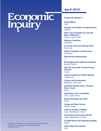
ECONOMIC INQUIRY
Scope & Guideline
Navigating the Complexities of Economics and Management.
Introduction
Aims and Scopes
- Empirical Economic Analysis:
The journal publishes papers that employ rigorous empirical methods to analyze economic phenomena, often utilizing advanced statistical techniques and large datasets. - Theoretical Economics:
Contributions that offer new theoretical insights or models in various fields of economics are a staple of the journal, including game theory, labor economics, and macroeconomic theory. - Policy Evaluation and Implications:
Many articles focus on assessing the impact of policies, such as public health initiatives, labor regulations, and economic reforms, providing valuable insights for policymakers. - Interdisciplinary Approaches:
The journal encourages interdisciplinary research that integrates economics with psychology, sociology, and public health, reflecting the multifaceted nature of economic issues. - Focus on Behavioral Economics:
A significant number of papers explore behavioral economics, examining how psychological factors influence economic decision-making and market outcomes.
Trending and Emerging
- Impact of COVID-19 on Economic Behavior:
A surge in research related to the economic impacts of the COVID-19 pandemic, including studies on labor market shifts, consumer behavior, and public health economics, demonstrates the journal's focus on timely and relevant issues. - Climate Change Economics:
Increasing attention to the economic implications of climate change, including studies on carbon pricing, renewable energy markets, and environmental policies, reflects a growing concern for sustainability within economic research. - Technology and Digital Economy:
There is a rising trend in exploring the economic effects of technology, digital platforms, and data privacy regulations, highlighting the importance of the digital economy in contemporary research. - Behavioral Insights in Policy Evaluation:
An emerging theme is the integration of behavioral economics into policy evaluation, with studies examining how psychological factors influence public policy effectiveness and economic outcomes. - Migration and Labor Economics:
Research exploring the economic impacts of migration, including labor market effects and social integration policies, is gaining traction, reflecting global demographic shifts.
Declining or Waning
- Traditional Labor Economics:
Research specifically focused on traditional labor economics, such as wage determination and employment patterns, has seen a reduction in publications, perhaps overshadowed by newer approaches that incorporate behavioral insights. - Static Economic Models:
There is a noticeable decline in the use of static models in favor of dynamic, time-dependent analyses. Researchers are increasingly favoring frameworks that account for changing economic conditions over time. - International Trade without Behavioral Considerations:
Papers that analyze international trade purely from a classical economic perspective, without considering behavioral elements or market imperfections, have become less frequent as the field evolves.
Similar Journals

REVUE ECONOMIQUE
Advancing Knowledge in Economics and FinanceREVUE ECONOMIQUE, published by PRESSES FOND NAT SCI POLIT in France, is a distinguished academic journal with an ISSN of 0035-2764 and an E-ISSN of 1950-6694. Established in 1974, the journal has evolved significantly over the years, focusing on a diverse range of topics within the field of economics, econometrics, and finance. With its commitment to presenting in-depth research and innovative perspectives, REVUE ECONOMIQUE serves as a vital resource for scholars, professionals, and students seeking to enhance their understanding of economic theories and practices. Although it is currently categorized in the Q4 quartile, ranking 241 out of 288 in the field, the journal aims to foster new dialogues and disseminate valuable insights that contribute to the economic discourse. The journal is not available as open access, but its rich repository of articles continues to attract readers interested in the complexities of economic dynamics. For more information, you can refer to their address at 27 RUE SAINT-GUILLAUME, 75341 PARIS 07, FRANCE.
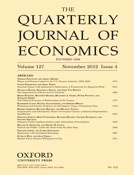
QUARTERLY JOURNAL OF ECONOMICS
Your Gateway to Premier Economic ScholarshipQUARTERLY JOURNAL OF ECONOMICS is a prestigious and long-established academic journal published by Oxford University Press Inc. With its origins dating back to 1886, this esteemed journal has continually provided a vital platform for the dissemination of cutting-edge research in the field of economics and econometrics. The journal holds an impressive Q1 ranking in the Economics and Econometrics category, positioning it at the forefront of scholarly contribution with a Scopus rank of #2 out of 716, reflecting its standing in the top 1% of the field. Although the journal is not open access, it offers a wealth of vital resources and insights that are indispensable for researchers, professionals, and students alike, as it aims to advance knowledge and influence economic policy and practice through rigorous academic inquiry.
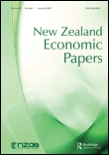
New Zealand Economic Papers
Illuminating economic pathways for researchers and policymakers alike.New Zealand Economic Papers is a prominent academic journal dedicated to the field of economics, published by Taylor & Francis Ltd. With its ISSN 0077-9954 and E-ISSN 1943-4863, this journal has been a significant contributor to economic discourse since its inception in 1966, continuing to provide valuable insights through to 2024. As part of the third quartile (Q3) in the Economics, Econometrics and Finance category, it ranks at #165 out of 288 in Scopus, placing it within the 42nd percentile, demonstrating its respectable impact in the academic community. Although the journal does not offer open access, it remains a vital resource for researchers, professionals, and students interested in understanding economic dynamics, policy analysis, and applied econometrics, particularly in the context of New Zealand. The journal's commitment to rigorous research ensures that it continues to play a crucial role in shaping economic policy and academic thought across the globe.
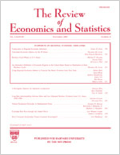
REVIEW OF ECONOMICS AND STATISTICS
Elevating research standards in economic studies.REVIEW OF ECONOMICS AND STATISTICS, published by MIT PRESS, stands as a pivotal journal in the fields of economics and econometrics, with origins dating back to 1978. As a high-impact publication with impressive 2023 rankings placing it in the Q1 category for both Economics and Econometrics, and Social Sciences (miscellaneous), it serves as a crucial platform for scholarly discourse. With an E-ISSN of 1530-9142, the journal provides vital insights and analyses that drive contemporary understanding of economic phenomena. Recognized for its rigorous peer-review process and influential research, the REVIEW OF ECONOMICS AND STATISTICS is essential for researchers, professionals, and students aiming to advance their knowledge and contribute to the field. Though it does not currently offer open access, its substantial impact factor and cutting-edge studies ensure that its articles remain indispensable resources for anyone dedicated to the advancement of economic research.
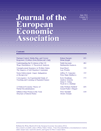
Journal of the European Economic Association
Navigating Complex Economic Challenges with Scholarly RigorThe Journal of the European Economic Association, published by Oxford University Press, stands as a cornerstone in the field of economics, boasting a strong impact factor that reflects its high citation rates and significance among peers. With an impressive Scopus ranking of 12 out of 288 in general economics, encompassing a remarkable 96th percentile, this journal is recognized for its rigorous peer-reviewed research contributions that advance the understanding of economic theory and policy. Dedicated to publishing innovative studies and theoretical advancements since its inception in 2003, it continues to engage scholars worldwide, providing vital insights applicable to both academia and industry. Although it does not follow an open-access model, the journal's extensive reach and commitment to excellence make it an essential resource for researchers, professionals, and students seeking to deepen their understanding of contemporary economic issues. Based in the United States, the journal reflects a European perspective on global economic challenges, making it indispensable for those at the forefront of economic research.

INTERNATIONAL ECONOMIC JOURNAL
Pioneering Insights in Economics and Finance.Welcome to the INTERNATIONAL ECONOMIC JOURNAL, a premier publication dedicated to advancing the fields of economics, econometrics, and finance. Established in 1987 and published by Taylor & Francis Ltd, this journal has consistently contributed to scholarly discourse and empirical research. With an impressive 2023 Scopus Ranking placing it at #112 out of 288 in its category, the journal holds a commendable Q2 quartile rating, reflecting its significant impact among economists and financial analysts alike. The INTERNATIONAL ECONOMIC JOURNAL serves as a vital platform for researchers and professionals to disseminate innovative findings, theoretical advancements, and practical applications in economic theory and policy. While not open access, the journal continues to attract a wide readership, offering insight into global economic trends and challenges. This makes it an essential resource for students, academics, and industry practitioners aiming to deepen their understanding of contemporary economic issues.

Review of Economic Design
Shaping Economic Thought with Peer-Reviewed Excellence.Review of Economic Design, published by Springer Heidelberg, is a distinguished journal that serves as a vital platform for researchers in the field of economics, econometrics, and finance. Established in 1996, the journal focuses on the advancement and dissemination of economic designs and models, contributing innovative theoretical frameworks and empirical analyses that influence economic policy and practice. With a commendable Q2 category ranking in the 2023 quartiles for its field, it features rigorous peer-reviewed articles that cover a broad array of topics within economics. Although it currently does not offer open access options, the journal's commitment to academic excellence is reflected in its comprehensive and methodologically sound publications. Scholars and practitioners alike benefit from engaging with the cutting-edge research presented in this journal, which encompasses both foundational studies and contemporary issues shaping the economic landscape. For those keen to stay abreast of the latest developments, Review of Economic Design is an essential resource, promising insightful contributions through the year 2024 and beyond.

Korean Economic Review
Exploring the dynamics of economics in a global context.Korean Economic Review is a distinguished academic journal published by the Korean Economic Association, dedicated to advancing the field of economics with a focus on both theoretical and empirical research. With an ISSN of 0254-3737, this journal serves as a vital platform for scholars and practitioners to disseminate innovative ideas and findings that enrich our understanding of economic phenomena. Operating in South Korea, the journal enjoys recognition within the academic community as evidenced by its Q3 ranking in the Economics, Econometrics and Finance categories as of 2023, placing it in a respectable position among its peers. While it does not currently offer open access options, its commitment to rigorous peer review ensures the publication of high-quality research. As the journal converges from 2012 to 2024, it continues to contribute to the global discourse on economic issues, making it an essential resource for researchers, students, and professionals striving to stay at the forefront of economic scholarship.
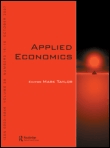
APPLIED ECONOMICS
Driving Evidence-Based Economic PoliciesApplied Economics, published by Routledge Journals, Taylor & Francis Ltd, is a revered platform in the field of Economics and Econometrics. Since its inception in 1969, the journal has maintained its commitment to disseminating high-quality research, covering a wide range of topics within applied economics that are critical for understanding and addressing real-world economic issues. With a notable Q2 ranking in Economics and Econometrics and a strong standing in the 67th percentile of Scopus rankings, it serves as an essential resource for researchers, professionals, and students alike, providing insights that bridge theoretical frameworks and practical applications. While the journal is not an Open Access platform, it continues to foster academic discourse and innovation within the economics community, contributing to the ongoing development of evidence-based policies and practices. Its accessibility and robust editorial standards ensure that the latest findings and methodologies reach an engaged audience, further solidifying its reputation as a key publication in the field.
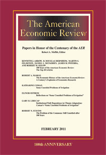
AMERICAN ECONOMIC REVIEW
Fostering Dialogue and Discovery in Economics.AMERICAN ECONOMIC REVIEW, published by the American Economic Association, stands as one of the most prestigious academic journals in the field of Economics and Econometrics. With an impressive impact factor and ranking of #9 out of 716 in its category, this journal has achieved a notable position within the top 2% of journals globally, as evidenced by its Q1 classification in 2023. Covering a broad spectrum of economic theory and applied research, it serves as a primary platform for the dissemination of high-quality scholarly work, contributing significantly to the ongoing dialogue within the discipline. Although Open Access options are not available, the journal's rigorous peer-review process ensures that published articles uphold the highest standards of academic integrity and relevance. With coverage spanning from 1973 to 2024, the AMERICAN ECONOMIC REVIEW continues to be an essential resource for researchers, professionals, and students eager to stay at the forefront of economic thought and innovation.